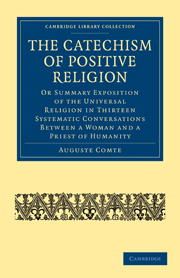 The Catechism of Positive Religion
The Catechism of Positive Religion Book contents
PREFATORY NOTE TO THIRD EDITTON
Published online by Cambridge University Press: 05 October 2010
Summary
In the preface to the fourth volume of his System of Positive Politics (Treatise of Sociology instituting the Religion of Humanity), Auguste Comte says:—
“Taking the volume as a whole, the general constitution of the religion has become at once more systematic, more moral, and more practical, by definitively placing the worship before the doctrine. I regret that this correction is subsequent to the composition of the Positivist Catechism, the purpose of which it would have aided. Without waiting, however, for a second edition of that short work, the improvement may be effected by dividing into two the long conversation on the doctrine as a whole. The first half, bearing directly on the theory of the Great Being (Humanity), should for the future form a separate chapter and follow on the Introduction. Then we may pass at once to the study of the worship and after it to that of the doctrine, the general conversation on which will thus be limited to its second half, the half which alone relates to the encyclopedic constitution.
“This division of a long chapter allows the adoption of the definitive arrangement, the transposition being easy, and involving no change in the exposition as it stands. I take the opportunity to urge the readers of my Catechism also to divide the last chapter, studying first the Fetichist and Theocratic part common to all nations, then the threefold transition peculiar to the West.
- Type
- Chapter
- Information
- The Catechism of Positive ReligionOr Summary Exposition of the Universal Religion in Thirteen Systematic Conversations between a Woman and a Priest of Humanity, pp. v - viPublisher: Cambridge University PressPrint publication year: 2009First published in: 1891


